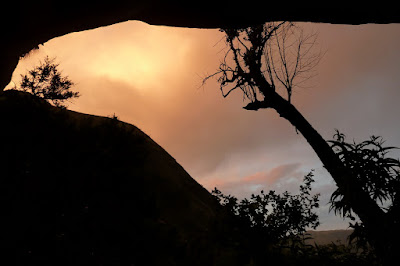 |
| Great light from Zulu Cave |
Christina and Bernhard from Germany had never camped in the mountains before. They just wanted to do 2 day hikes in a nice area. Didn’t they want to overnight in a beautiful cave instead, I asked them? To stay in a cave is of the unique experiences that we are fortunate to have in the Drakensberg. The Bushmen used these natural shelters, formed by erosion in the Clarens sandstone, for many thousands of years before the arrival of the white man in the mid 1850s, when they were sadly hunted for trophies until they were completely exterminated. The Bushmen are now long gone but the caves are still there. Some of them feature some of the finest rock art in the world, which is one of the reasons why the Ukhahlamba-Drakensberg Park was declared world heritage site in 2000.
So I managed to convince them to be like a Bushman for one night. They had never hiked with a backpack on but being only one night it wasn’t much that we needed to take with us. I provided all the camping equipment and they brought their clothes, the right attitude and a good sense of humour. They managed without any problems, it was something new for them and they realised they quite liked it.
If you would like to do this hike contact us at info@spanafrican-adventures.co.za or have a look at our website www.spanafrican-adventures.co.za for other exciting options.
 |
| Christina and Bernhard at the start of their first backpacking trip ever! |
 |
| Helichrysums, probably the most common flowers in the Drakensberg |
 |
| Crystal Falls, barely 2km after the start of our hike. We had gained though in hot temperatures though , so a little refreshing time had been well earned |
 |
| Hesperantha baruii |
 |
| The long way to Blindman's Corner |
 |
| Another night in Zulu Cave, a well known shelter in the Drakensberg |
 |
| Most caves in the Drakensberg are formed in the Clarens Sandstone cliffs |
 |
| A morning shower before our return |
 |
| the steep climb from the Mhlawazini River |
 |
| Moraea brevistyla |
 |
| Scabiosa drakensbergensis |
 |
| From left to right, from highest to lowest: Cathkin Peak, Sterkhorn, Tower and Amphletts |
 |
| Corycium nigrescens (black-faced orchid) |
 |
| Descending Keartlands Pass |
 |
| Signs like this are common near main camps. But a little further away there's nothing to guide you but a good hiking map |


No comments:
Post a Comment